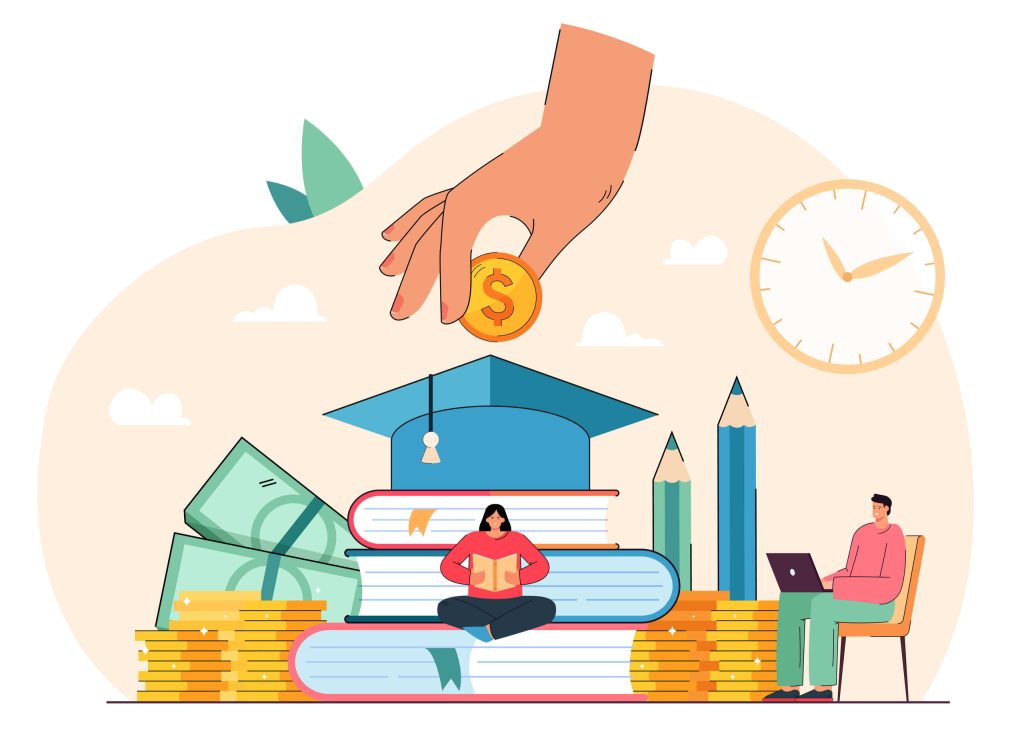
The unanswered question of every student in the modern generation is, “How to be financially independent as a student?” The current generation is struggling with monetary challenges, especially in managing money and investing.
One of the main reasons for this is individuals’ lack of financial education. Students often become prey to scams executed by fraudsters, which are highly popular due to the absence of basic knowledge of finance.
All this can be prevented right now with proper guidance and strategies. Even though you may not have the basic knowledge to understand financial dealings, it is never too late to learn.
If you are struggling to generate a profitable income, then feel free to learn about how to make income while pursuing school or college. Becoming financially independent at a young age requires financial literacy and money-management skills.
This guide will cover all the required topics regarding financial independence, such as budgeting, savings, investing and earning—securing the risks of financial outbursts.
If you are struggling with how to meet your financial requirements, then do not worry; Finquo Versity has specially curated a comprehensive guide to attaining financial stability at a young age.
Becoming financially independent is indeed a challenging yet rewarding journey that demands dedication and willpower.
In a world overflowing with enticing commodities and persuasive marketing, resisting the urge to spend unnecessarily can be tough. When parents are struggling hard to provide for education, it feels irresponsible to ask for further financial needs from them.
As individuals, it is your responsibility to manage your financial needs yourself. Regulating and monitoring financial decisions consistently will ensure financial freedom.
However, financial independence starts with mindful spending, budgeting, and saving. It involves setting clear financial goals, educating oneself about personal finance, and possibly investing wisely.
Additionally, it requires a strong commitment to living within or below one’s means, avoiding debt, and consistently building an emergency fund.
By prioritising long-term financial stability over short-term gratification, anyone can take control of their finances and work towards a future of financial independence. Achieving financial independence begins with small steps.
Achieving financial freedom as a student involves taking control of your money. With Finquo Versity, you can learn about everything you need to know about financial freedom on our mobile/web applications. Right now, let’s go through this comprehensive guide to achieving financial freedom.
The first step to becoming financially independent is to understand the importance of becoming financially independent. Understanding the financial situation will help to navigate the course of action. During our 20s, we may not excel at dealing with financial situations.
However, it is our responsibility to gain the required financial education to overcome the struggles. Therefore, understanding the importance of becoming financially independent is crucial throughout the journey.
Gaining financial literacy is crucial for making financial decisions. Learning about money management at an early age in your career can improve your ability to deal with financial challenges.
Seek opportunities by enrolling in certificate courses that can not only enhance your money-developing skills but also navigate your financial opportunities. Learning the basics of budgeting, saving, investing, and debt management will help you build a solid financial situation.
In addition, staying up-to-date with financial trends and strategies ensures you seize better opportunities and avoid pitfalls. Investing your time in learning economics is an effective way to improve your financial knowledge, ensuring that you make informed financial decisions.
Creating financial goals is crucial for meeting financial stability. List out important things you need to clear out first, such as loans, mortgages, or any other pending amount to pay. Then, build a financial plan with clear timelines and amounts.
Set deadlines to pay the rent and debts so that you do not get behind on it. Define and elaborate on all the goals you need to achieve. Prioritise the financial goals by paying on time. Regularly adjust your timeline and goals as per your financial situation.
In this way, the gradual completion of each financial goal can pave the way to gaining financial sustainability.
Planning a budget based on the financial situation and earnings is essential to navigating your expenditures. A detailed budget can help you to easily track and record your expenses. Moreover, it will help to spend your money wisely.
Regulate the money flow to the needs according to the financial situation. Regularly monitor and analyse the budget every month to evaluate the expenditures. Adjust as per your financial situation.
This comprehensive approach will help to understand where the money flows as well as help to reduce unwanted expenses and utilise those funds for savings or investments.
Generating a source of income is important in sorting financial struggles. Having a source of income is like having wheels to attain financial stability. The potential earnings can be used to pay off financial goals. Money-making opportunities are available in plenty. The best-suited form of earning as a student is by doing part-time jobs, trading, dropshipping, or social media influencer.
Becoming a gig worker is another option for earning. Gig working is a nonstandard work arrangement that includes freelancing, self-employment, or temporary project work. Becoming a gig worker has the benefit of making enough money as well as gaining experience in the respective field of work.
At the same time, do not put yourself under too much pressure to earn from these passive sources. Focusing on the studies should be prioritised, as it could provide better career options. Graduating and getting a good-paying job can smoothen your financial struggles.
Once you begin generating income, it is important to monitor your expenditures. Spend wisely on things that are prioritised for your needs.
Practice living a healthy lifestyle by avoiding the consumption of alcohol and smoking cigarettes, and make sure to cut off unwanted expenses.
Cultivating the habit of saving the remaining portion of your budget can help you boost your financial stability and may not put you at financial risk in the future.
Disciplined spending and consistent saving are the keys to ideal saving.
Once you start earning regularly, prioritise paying off your debts and mortgages. Record and analyse the dues of all the loans and rents. Start by paying off the first one-reach due date to prevent a penalty.
Focusing on paying off before the due date to maintain financial goals. Monitor the budget and channel the additional funds, if any, to pay off the dues completely for once and all.
This will help you to source the incoming money towards investments, savings, or others instead of paying debts.
Monitor and regulate as per the financial plan. Closing the debts as soon as possible to come out of the credit trap. Make sensible decisions to bolster your financial career.
Investing options for students helps to build a source of income. There are several investment options available globally.
Gaining exposure to the stock market will further help to bolster knowledge on trading choices. Seeking guidance from platforms like Finquo Versity may help to improve knowledge.
Another option is micro-investing, which includes investing a small amount of money in reliable stocks. Researching thoroughly before investing will help identify the potential chances. Analysing the stocks will help secure the risks of the investment.
Furthermore, long-term investment is another great option. Investing in the long term has its own greater benefits. Investing for the long term often reduces the potential risk by balancing out the fluctuation in prices over the long haul.
One of the many advantages of investing long-term is the huge interest generated over a period of time. It provides numerous benefits that significantly improve financial security and wealth accumulation.
Student discounts are beneficial to reducing expenses. Numerous organisations from education, restaurants, transportation, entertainment, and others are offering coupons, vouchers, and discounts in favour of students.
Getting a discount on these daily necessities can help save the remaining budget. Moreover, academic software tools such as Microsoft and Adobe often come with slashed prices for students.
These discounts allow students to purchase these tools for affordable prices. Availing these student discounts will help to lessen the expenses and save more money. These offer benefits for students to avail quality products at low prices.
Developing effective time management skills to balance work and studies. Use the necessary tools to list out your schedule and prioritise your tasks. Establish boundaries between work and study.
Try to differentiate between work and study times. Prevent burnout and exhaustion from an overload of stress. Take advantage of tutoring services, study groups, and career counselling while managing work commitments to excel academically.
In addition to all these, avoid overspending or try not to live beyond your financial capabilities by spending more than you need. Always seek financial guidance for better clarity. Focus on your career more to ensure a better source of income.
Regularly practising and transforming these actions as a habit can be permanently incorporated into your financial lifestyle.
Consistency is the key to achieving long-term benefits. Blending these financial strategies into your daily life can, respectively, have a longer and more powerful impact on your financial security in the future.
These are some of the strategies that will help to attain financial stability at a young age.
As you have now reached the end of this, ‘How do I become financially independent as a student?’ Let us tell you that achieving financial stability as a student requires discipline, planning, and making informed decisions.
First and foremost, creating a budget is essential. This means tracking your income, whether from part-time jobs, scholarships, or allowances, and ensuring it covers your expenses, including tuition, books, rent, and daily necessities. It’s also crucial to be informed about financial aid options, student discounts, and low-interest loan opportunities.
By avoiding unnecessary debt and making conscious spending choices, students can lay the foundation for a stable financial future.
Ibnujala is a seasoned financial expert of Indian and Middle Eastern markets with an experience of over 15 years. His deep interest in neuroscience fuels his research in seamlessly blending finance and science. With a bachelor’s degree in law from India and an MBA from the UK, his diverse academic background makes him an expert in financial management and mentorship. In addition to being a seasoned investor and serial entrepreneur, he currently serves as the CEO of Finquo Versity.
Disclaimer: The information provided in this blog is for educational and informational purposes only and should not be considered as financial or investment advice. Stock market investments are subject to market risks, and past performance is not indicative of future results. Readers are encouraged to do their own research and consult with a licensed financial advisor before making any investment decisions. The author and publisher are not liable for any financial losses or damages incurred from following the information provided in this blog.

Uma Nair
